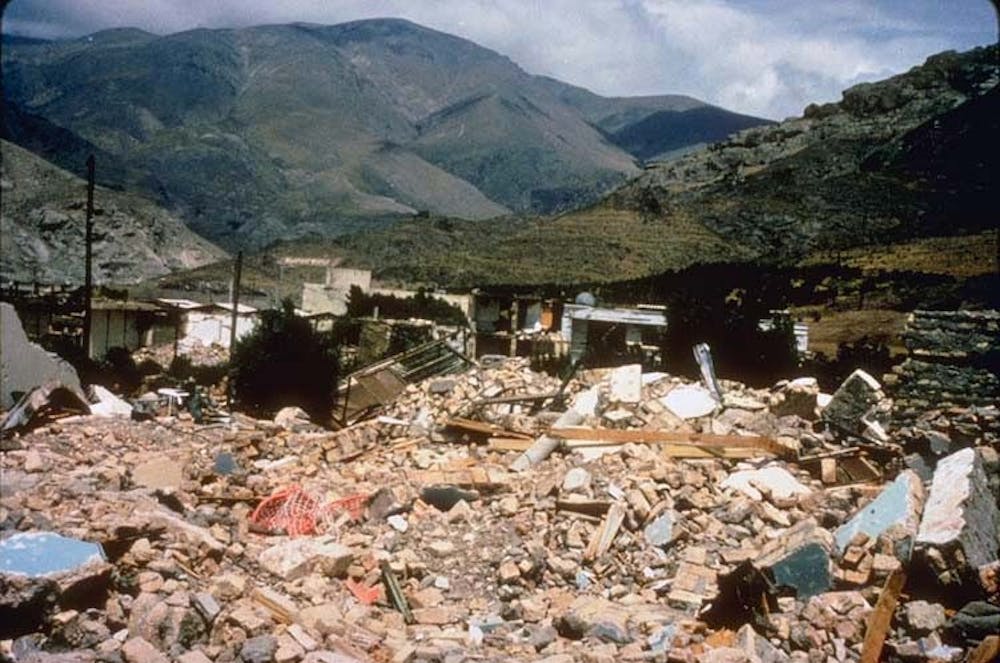The world today is politically polarized and radically diverse, riffed by the divisions of politics, international relations, and conflicting ideologies. In this landscape, natural disasters are some of the only instances left in which global citizens form a unified, cohesive response. Individuals and leaders of different nations, faiths, and political ideologies overcome obvious differences, banding together to provide aid and security to those afflicted in these catastrophes. We saw such a response in Haiti and Fukushima, and more recently in Texas, Louisiana, and Puerto Rico.
But our sympathy and the strength of our response is not consistent. Our hearts are seemingly uncaring when disaster strikes a particular people; our thoughts and prayers are selective. The 7.3 magnitude earthquake that hit Iran and parts of Iraq on Nov. 12 — the deadliest earthquake of 2017 — stimulated a far colder, weaker response than other recent disasters. Over 500 Iranians were killed in the natural disaster, and over 12,000 individuals were injured and displaced by the devastation and destruction to homes, infrastructure, and buildings in the region near Iran’s western border with Iraq. The survivors were forced to take refuge outside the ruins of their houses and living spaces in makeshift tents in regions where temperatures dip below freezing in the night. But despite the catastrophic damage and loss of life, the media and collective conscious of our country fostered no sense of empathy and bolstered no sense of responsibility to respond with the urgency offered to Haiti, Japan, or Houston.
The Iranian earthquake was clearly underrepresented in mainstream news. No articles from the most popular news sources came out shedding more light on the earthquake; there was a distinct absence of substantial coverage of the disaster in the 24-hour news cycle following the earthquake. Similarly, social media — a medium so often in tune and ablaze with attention to all parts of the world — appeared to me uncharacteristically silent.
I had a very different response to Iran’s disaster. As the son of Iranian parents who came to this country seeking peace in the midst of the country’s 1979 revolution, the news of this tragedy in my familial and ancestral homeland took hold of my heart in a way that no other breaking story truly could. With family still living in Iran, I was immediately overcome by the fear of loved ones being harmed by the earthquake. While my family members were untouched by the earthquake, the very notion of worrying and feeling such a tinge in my heart moved me to an emotional and somber realization amidst a current society that seemed to have turned a blind eye to the devastation felt in Iran. In turning my worries and attention to a place stricken by disaster, never mind the fact that it felt so dear and close to my heart and identity, I was alone.
The reality is that the west has demonstrated, in large part, an inaction and a carelessness towards the people of Iran. An increasingly antagonistic political relationship stemming from the 1979 American hostage crisis has rendered American consciousness largely unresponsive and apparently uncaring towards the people of Iran. With this dehumanization, Iranians are seen as the other, a people disconnected from our common humanity and the need for collective action in the face of tragedy. The fog of an understandably hostile and rocky political relationship between the two countries renders us desensitized to the horrors felt by our fellow human beings and inoculated to the blatant inaction on our part.
But politics even seeps into the channels of direct humanitarian relief. Because of harsh sanctions imposed on Iran by the United States, Americans who want to donate money to the cause are not able to do so easily. Forced to provide financial contributions only through a small number of certain institutions, the potential flow of aid and humanitarian relief to Iran from the United States proves constricted.
This obvious and saddening disregard weighs heavily on the notion of human compassion that we so desperately try to achieve towards others. The neglect and turning of the heart from those who need it most pulls and hurts our simple conception of kinship with one another, and the only way to rebuild and to replenish this void of compassion is through a renewed devotion to care, help, and humanize the other.
In our current political climate, it seems forcibly and unrealistically idealistic to expect any sort of deviation from the norm with a President and a political system so riffed and divided by party agenda, fierce rhetoric, and a lack of compassion and common human decency. So I turn my attention to you, the people of Princeton, of the United States, of our society. In the face of negligence, seek out, acknowledge, and grip the causes and the peoples that cry for help; in the face of a disregard of humanity, embrace the other.

While the people affected by the natural disaster in Iran remain devastated by the deadliest earthquake of the year, lend your ears and your hearts to help them, to listen to their struggle, to open your arms to embrace these fellow humans in despair. Iranians are a loving, beautiful, and culturally rich people whose civilization draws its roots to the ancient beginnings of human society. They have left their mark on the history of the world through lasting contributions in literature, poetry, art, music, science, math, religion, politics, and language. Amidst such truths and the clear signs of our reality, these moments demand reflection and a reevaluation of the self. What lies at the heart of our compassion and care for those in need? And why do individuals' concern, empathy, and love sometimes remain silent? In the words of the fourteenth century Persian poet Hafez who is now regarded as one of the greatest writers in the tradition, “What’s happened to the breeze of spring?”
Kaveh Badrei is a sophomore from Houston, Tex. He can be reached at kbadrei@princeton.edu.









